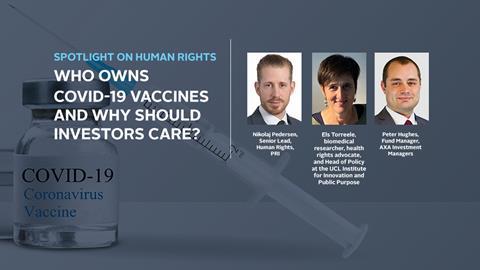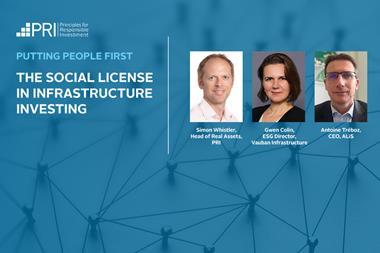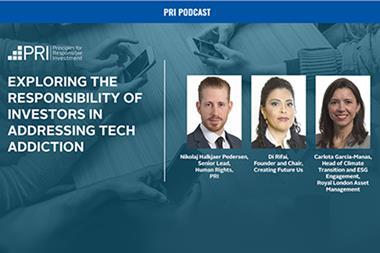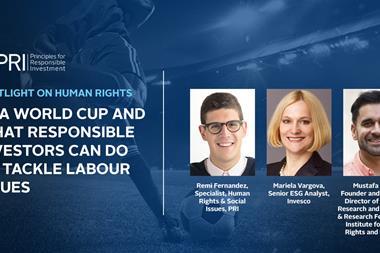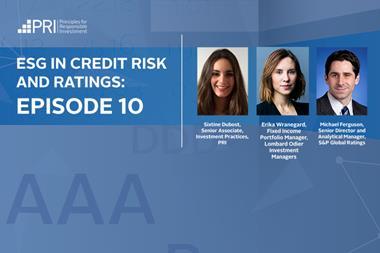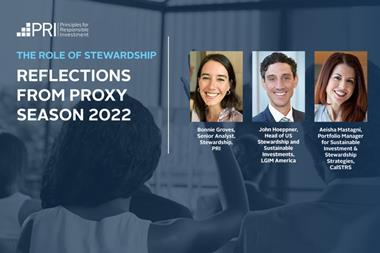As of July this year, more than 80% of vaccine doses globally had been given to individuals in high and upper-middle-income countries. Only 1% of people in low-income countries at the time had had at least one dose.
The United Nations commissioner on human rights has stated that “affordable, non-discriminatory access to the vaccine is a human right” and because of the failure to provide fair and equal access to the vaccine the World Health Organisation has stated that the world “is on the brink of a catastrophic moral failure”.
The economic consequences are also grave with an estimated $9.2 trillion lost if governments fail to ensure that developing economies have access to COVID-19 vaccines
What is wrong with the current research and development system? Why does ownership of IP, know-how and technology matter? And what can investors do?
Listen to this episode as we explore these questions with our esteemed guests.
With Elena Espinoza and Nikolaj Pedersen, PRI, Els Torreele, UCL Institute for Innovation and Public Purpose and Peter Hughes, AXA Investment Managers
Note: The Principles for Responsible Investment podcast is designed to be heard. If you are unable to do this, this transcript offers an insight into the episode.
Transcripts are generated using a combination of speech recognition software and human transcribers, and may contain the occasional error. Please check the corresponding audio before quoting in print.
Subscribe to the channel via Apple podcasts, Spotify, or wherever you listen to your podcasts.
Nikolaj Pedersen
Hello and welcome to the PRI podcast. My name is Nikolaj Pedersen and I’m the PRI’s lead on human rights.
Elena Espinoza
And my name is Elena Espinoza and I’m senior specialist in the social issues team at the PRI. So Nikolaj, thank you for being here with us today. So, for those that are just joining us for the first time, what is the spotlight on human rights podcast series, and what is the focus of this particular episode?
Nikolaj Pedersen
The spotlight on human rights is a PRI podcast series in which we bring social issues to life, through the insights of experts and testimonies by people who have first-hand experienced harm by companies. In this particular episode of the series, which is the fourth, we will explore ownership and distribution of COVID-19 vaccines and discuss what actions investors can take to tackle unequal access. We will hear from Els Torreele, a biomedical researcher, health rights advocate, and head of policy at UCL Institute for Innovation and Public Purpose. Els will help us understand why the current research and development system is ill designed to facilitate fair and equitable access.
And our other guests is Peter Hughes. Peter is a fund manager with expertise in the healthcare sector at AXA Investment Managers, which is one of more than 150 investors involved in a recent public statement, demanding an effective, fair, and equitable response to COVID-19. You will hear Peter explain why vaccine nationalism and technology transfer are important issues.
Elena Espinoza
So, before we touch on the topic of equitable access, can you tell us how were COVID-19 vaccines developed?
Nikolaj Pedersen
It’s important to begin by understanding the context in which COVID-19 vaccines were developed. Firstly, vaccines are often not very profitable. This means that pharmaceutical companies generally favour developing medicines that must be taken repeatedly over vaccines that are given only once or twice. In order to overcome this challenge governments in our current scenario in response to COVID-19 have given companies billions, basically to turn research into effective vaccines. For example, it is estimated that the AstraZeneca vaccine, although developed by Oxford University Jenner Institute, it was up to 97% to 99% funded by the British government.
And similarly, the Trump administration negotiated deals worth US$10 billion with seven companies to fund the discovery of a COVID-19 vaccine. Despite COVID-19 vaccine research, being publicly funded, pharmaceutical companies own the intellectual property or IP as it’s called.
Elena Espinoza
And how does this idea of intellectual property link to vaccine nationalism?
Nikolaj Pedersen
Most pharmaceutical IP owning countries or regions, for example, China, the EU UK and the US have defended the global IP regime opposing to waive IP rights for these technologies needed to combat COVID-19 and protecting the IP of COVID-19 vaccines has been identified as a key factor, not the only one as we’ll hear later, but prolonging the pandemic failure to share the IP of vaccines have and will particularly affect many low and middle income countries. Already in late 2020, Oxfam warned that nine out of 10 people in poor countries would not have the opportunity to be vaccinated even in 2021.
Elena Espinoza
And what do failures in equitable distribution mean globally?
Nikolaj Pedersen
In July this year, it was reported that more than 80% of vaccine doses globally had been given to individuals in high and upper middle-income countries. Only 1% of people in low-income countries at the time had had at least one dose. So, the failure to distribute the vaccines fairly has resulted in the World Health Organization stating that the world is on the brink of what they call a catastrophic moral failure. And similarly, the United Nations Commission on Human Rights has stated that affordable non-discriminatory access to the vaccine is a human right.
And in modern monetary terms, a study by the ICC Research Foundation has revealed that the global economy could lose as much as US$ 9.2 trillion if governments fail to ensure the developing economies have access to COVID-19 vaccines.
Nikolaj Pedersen
So Els, could you give us some background to the historical way in which medicines are owned and distributed and what issues that you see arising from the system?
Els Torreele
Sure. I think the short version is what I would call we, we are living in a winner takes it all system. So, medicines have become, first of all, ordinary market commodities not actually ordinary, but luxury marketing, commodity markets, commodities. But they are actually constructed in a way that the ownership always ends up with one party, which is typically the private company that markets the
drugs. And that happens two or three different things. The first and a very important one that people know about is the ownership of the intellectual property patents in general. But there is actually also the much broader ownership around the data. The technical know-how the technical knowledge and everything comes together in what is called the marketing authorisation holder. It’s actually a big dossier that the company submits in each country to the marketing the regulatory authority.
And it contains all the data that we know about the evidence and safety, and also the way you produce the medicines, et cetera. And this is actually what gives the company, the authorization to, to produce and market and sell the drugs. So usually companies will have votes, the intellectual property rights and that marketing authorisation. And then we have a third element, which is the structure of the financing. We are in a system very shortly where public financing is invested in medical innovation for the benefits of economic growth, and often given with no strings attached while private financing is where the companies try to maximise return on investments. And the combination of these three things makes that the winner, the one that has the marketing authorisation and the intellectual property has the full control and ownership of everything that has been done.
So, all the research that may have taken 20 or 50 years that culminates into the development and the availability of a vaccine or a medicine will all be owned by the company. And there is no way in which we have currently a recognition that all these other contributions, whether it’s through financing or through intellectual capacities, 20 years of public research, for instance, in today’s MRNA vaccines for COVID, that is all somehow lost because the ultimate owner of the patents and the marketing authorisation will be the private company. And that is what I call a winner takes it all system.
Nikolaj Pedersen
Interesting. And in this situation we’re in today specifically on the COVID-19 vaccine, what is in your view, the consequences, what is the practical consequences of this system?
Els Torreele
Well, what we have seen today is this very extreme vaccine inequity because you have a handful of companies that own in the way that I just described the full control or intellectual property rights technology, know-how for the production of these vaccines and they choose how much they make, where they make it, to whom they sell it, how much they sell it at what price they sell it. And so, what we have seen is that we have a handful of vaccines and we have done a handful initially of wealthy countries who have bought actually even before the vaccines were available, has bought or have bought all the stocks, such that there is nothing left for the rest of the world. And so, we have an artificial scarcity because we could have produced much more vaccines if we would have shared the knowledge and ownership and control over these vaccines, but companies have systematically refuse to do that.
And we have to also admit that wealthy countries that have in part paid for much of the research and development for these vaccines. But also, the risks to a large extent, this development by these very big advanced markets commitments advanced purchase commitments that European countries and the US in particular, but others as well have made, they have contributed to blocking basically all the stocks in the hands of a few. And so many countries have not been able to buy the vaccines they needed sufficiently and at the time they needed it. And maybe one thing that I really want to emphasise here is that if, we knew already, from the beginning of the pandemic, that if we would have vaccines that the best way, the most effective way to curb and stop the pandemic would be actually to distribute the vaccines in an equitable way to allow actually the vaccination of the most vulnerable people first, those that are highest risk of dying and having severe disease and the health workers, because the health workers, they are the basis of our health system, not just protecting us against COVID, but everything our whole health is dependent on health workers.
So, protecting health workers everywhere, and then start vaccinating the most vulnerable, the ones with the highest risk of dying of COVID first would have been the best way to minimise the harm done by the virus and also control the pandemic. Now, what we have seen through the combined monopoly positioning of the companies and the hoarding and nationalism of wealthier governments, what we have seen is that was completely thrown apart. And so, governments have said, well, we will vaccinate all of our population first, and that has done of course created this enormous vaccine inequity that we see today.
Nikolaj Pedersen
You mentioned production of course before. Are there any other factors at play here? Is it all a question of ownership? If we freed the intellectual property rights, made it more freely available, would we be able to then have this more fair and equal distribution that you mentioned? Are there other factors we also should be aware of?
Els Torreele
Well, as I already mentioned, it’s not just the intellectual property rights. It’s actually the knowledge, the technology, the infrastructure as well, but let’s not forget… I mean, for instance, the example of MRNA vaccines is very illuminating. A year ago, nobody knew how to produce MRNA vaccines at any scale, because we had never done it before.
So, it was perfectly possible for Moderna and Pfizer, to find ways to build manufacturing capacity and scale up on a short term, if we would have started that elsewhere a year ago, we would have been able to do that as well, but it requires the sharing of the, of the know-how and the technology as well. It’s not just the question of intellectual property or of patents. So that is certainly needed. Then there are the investments that are needed.
Obviously. I mean, I mentioned the advanced market commitments that Western governments gave to these companies. They have used that to build a manufacturing capacity, even before we had proof of the effectiveness of the vaccines. This is an enormous de-risking that normally doesn’t happen in a typical market situation. We’ve done that because it was a pandemic, which is great, but we should do that again in other countries and build, for instance, maybe public manufacturing capacity or manufacturing capacity that actually has the commitment to deliver and supply in an equitable way. Not as it is today. I want to remind you, I mean, it was a few weeks ago that we learned that Johnson & Johnson, who has a deal with Aspen, which is a South African manufacturing facility. They have a deal that parts only the very last bit, which is called fill-in finished to do that in South Africa, that they exported in August of 2021.
They export it at least 10 million doses to Europe, where we have a 70% vaccination coverage from a country, South Africa, where people are dying because they don’t have access to vaccines because they were not able to buy them. That is something that, which again, the risks to the control and who decides where vaccines are being delivered. We cannot leave that to secret agreements between governments or, I mean, you and, and, and a private company. And that brings me to another aspect. The, the fact that we consider vaccines and other life-saving technologies as ordinary market commodities makes it that it seems acceptable that agreements are secrets. We don’t know how much what price exactly is being charged. We don’t know what are the, the supply agreements, the delivery priorities, how a company chooses to indeed first supply Europe and not South Africa or any other countries.
There is such a lack of transparency because we think, well, it’s a normal market, but it’s not actually, many normal markets are more transparent than the medicine markets, because there is well-kept secrets around how much has it actually cost to develop a drug or a vaccine? How much does it cost to manufacture? Our price is being set. What is the not-for-profit price some companies claim they are charging? No one knows because there is no transparency, nor transparency about how they choose where to deliver. So, all of that for public health is highly problematic, and that’s maybe I think a bottom line that we really need to keep in mind health and medical technologies for public health should be dealt with in a different way. And this has been, actually, if we go back to historically, it used to be different.
I mean, penicillin, for instance, or the polio vaccine, these have been developed by scientists. And everybody thought back then that it was normal, that they would be made available for everybody as soon as possible and made accessible. It has been a gradual commercialisation and financialisation of this biomedical research sector, the pharmaceutical sector, that has made health technologies to this luxury commodities, but it doesn’t have to be like that. We could go back to actually considering that knowledge for health is not a part of the profitable knowledge economy, but of a sharing economy where we think that developing new technologies for health need to have the objective of being available for everybody in an affordable way. That’s a very different conception of how you drive your economic activity if the goal is health for all, rather than increasing in shareholder value or return on investment.
Nikolaj Pedersen
So, Peter, we’ve now heard from Els describe some of the issues in the system. I’d like to hear your reflections too, in terms of what factors you think are driving what we see now in terms of unequal access to the vaccines.
Peter Hughes
Sure. Well, I think, you know, firstly, as far as intellectual property regimes go, I think this has been a perennial discussion. And it’s always going to be a case of trying to balance reward for innovation versus the need for competition, and certainly the desire not to create permanent monopolies that discourage future investment and, and discourage re-investing successful proceeds from successful drugs into new investments.
So, it’s always been something that we discussed, you know, last year in, in the biotech industry almost a hundred billion of private investment was put into the biotech industry. And over the last five years, if you look at the US have more drugs approved over the last five years, and, and are there any other five-year period going back over the long term? So, you can argue that the results have been quite successful for the current situation, but it’s always going to be a case that we ensure that those proceeds get well distributed through the system that people get rewarded for taking that risk of investing in innovation because only one in every 10 drugs or vaccines enters the clinical trials will actually get through.
So it’s very high risk issue. It’s not the only issue at play, of course. So, one of the biggest challenges of the pandemic was that we needed the vaccines as quickly as we possibly could, and to have got the vaccines approved within a year of basically first finding out what this, this whole new disease was in COVID-19 we were able to get multiple vaccines approved, that’s quite a remarkable achievement, but that required unprecedented collaboration between government and industry and had many different people in order to get that done. And it also meant that you had to ramp up production before you saw any of the clinical data, and that costs hundreds of millions of dollars to do. And so, one of the biggest challenges for pharmaceutical companies was where’s that investment going to come from. And that’s where, you know, we saw government stepping in to provide that funding in order to get that ramped up as a condition so that they then demanded immediate access.
So, it kind of ingrained the basic inequality that we see now where the majority of the vaccinations are happening in high-income countries. So, we obviously have that, that significant issue. But then there’s also things to consider around the underlying complexity of the technology. I think about two of the leading vaccines are based on MRA technology, you know, that was not a technology used on an approved product prior to the vaccines coming along.
So having the expertise to, to formulate that into a vaccine to ramp up production is not a common skill set that we see around the world. So, there’s significant challenges there, you know, not only did these companies have enough on their plate trying to ramp up such a dramatically complex logistical challenge, but then to try and share that technology globally was then an additional challenge that was very difficult to do as well.
Nikolaj Pedersen
So the, the innovation and development of COVID-19 vaccines have obviously been incredibly quick, but you mentioned the issue of distribution yourself. Why is that an important topic for AXA?
Peter Hughes
You know, we are global investors that invest not just in healthcare, but across a whole range of sectors, including logistics, cold chain storage and logistics. And so, it’s important for us to understand the challenges in getting to people in low- and middle-income countries, particularly those who might be living in remote areas and any way that we might, as investors in those companies, be able to help and encourage them to get involved in this, this effort that is really a multidisciplinary effort that goes across sectors. So, for us, it’s important to understand where all the pressure points are in the system. And when we think about the engagement activities that we do as investors, it’s helpful to know where we might be able to encourage greater investment, greater focus in order to solve problems that, let’s face it, this is a problem that everybody has been impacted by global.
Nikolaj Pedersen
And how are you actually engaging with pharmaceutical companies? I’m sure this will be of interest to our listeners. What are the ways in which you engage with those companies?
Peter Hughes
Well, one of the principal things that we did is we were a signatory of the call to action from investors from the Access to Medicines Foundation to improve equitable access to the vaccines. I think this is important because shareholders are one stakeholder, but they are a stakeholder with a voice and putting it out there very clearly that we believe greater efforts should be taken by all stakeholders to ensure access to the vaccines is one important thing that we can do so that when then pharmaceutical companies are negotiating with governments about who’s going to get how many doses are when they can point to their own shareholders and investors as supporting their efforts to get equitable distribution. So being very vocal about that, I think is something very important. We’ve worked very closely with the access to medicines foundation for a number of years.
I think that’s part of multiplying the impact that we can have by working with other investors and by working with the foundation to understand, okay, what are the best practices in equitable access, not just of vaccines, but of all pharmaceuticals and vaccines, and then engaging with companies. And I think a lot of that is done in a listening mode, listening to what companies are doing, understanding what, who are the leaders and what are the best practices, and then pushing companies to do more. And I think we should never forget that at the end of the day, these pharmaceutical companies are run by people. And there are people within those businesses who want to make a tremendous impact with the innovations that they produce and having the shareholders, the investors saying to the senior people within these businesses, we want to see you doing the best you possibly can. We want to see you making a positive impact, not just making a great financial return, but making a great societal return as well that empowers the people within that business to go and do more and make a bigger impact.
Nikolaj Pedersen
Thank you for listening today. You can find plenty more episodes on the PRI website, on Spotify and Apple podcasts, whatever is your favourite platform.
Speak to you soon, and bye for now.
Interested in the resources discussed in this episode?
Investors issue urgent call for “fair and equitable” global response to COVID-19
Study shows vaccine nationalism could cost rich countries US$4.5 trillion
Downloads
Who owns COVID-19 vaccines and why should investors care? transcript
PDF, Size 0.24 mb


